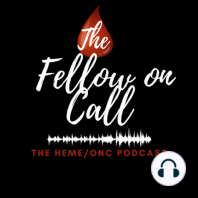20 min listen

Episode 021: Pharmacology 101: Part 2
Episode 021: Pharmacology 101: Part 2
ratings:
Length:
20 minutes
Released:
Jul 13, 2022
Format:
Podcast episode
Description
Picture this: it's day 1 of fellowship and your attending needs you to "get consent for treatment." Huh? How do you educate your patient? We share our tips! In this episode, we discuss important considerations, including “does my patient need a port?”, “what if drugs extravasate?”, “how do I keep side effects of drug classes straight?!” *The resources we share are our OWN opinions. Naming of resources are not endorsements. We are not sponsored by any of these entities. Pharmacology 101: * Irritant vs. Vesicant:** Each drug is deemed one of these based on the degree of tissue damage that can result if drug extravasates under skin.
** Vesicant: needs central access
** Irritant: can be given peripherally
* Does my patient need a port/picc?** If vesicant; for continuous infusions over several days (e.g. 5-FU); some patients with difficult access may request.
*Advantages of ports: ** Easy access for labs
** Easy access for chemotherapy/fluids
* Disadvantages: ** Risk of infection
** Risk of thrombosis
* General overview of chemotherapy side effects: ** Going to target the fastest growing cells in the body, which includes cells that line the GI tract, skin, hair/nails, and blood cells
** Therefore side effects are related: *** GI: nausea/vomiting, diarrhea (sometimes constipation), decreased appetite, taste changes
*** Low blood counts **** WBC nadir ~10-14 days (generally), and recover 21-28 days after chemo
* What about unique side effects of chemotherapy classes? How do we keep them straight?** We love keeping “Chemoman” from the USMLE study days in mind!
* Anthracycline*** MOA: Topoisomerase inhibitors
*** Ends in “rubicin”
*** You might hear people call doxorubicin the “red devil”
*** Used in lots of cancers
*** Hair loss occurs with this one
*** Known to cause cytopenias and associated with higher nausea potential
*** Unique side effects: **** Heart failure (always get baseline echo!)
**** Development of MDS and leukemia
* Alkylating agents** MOA: Drugs add alkyl group to the guanine base of the DNA molecule, preventing linking of strands
** End in “fosfamide”
** fosfamide or cyclophosphamide (AKA cytoxan)
** Used in lots of cancers
** Known to cause cytopenias and hair loss
** Unique side effects:*** Secondary MDS or leukemia possible
*** Ifosfamide = neurotoxicity = methylene blue antidote
*** Cyclophosphamide = hemorrhagic cystitis due to acrolein byproduct accumulation = prevent by giving mesna to protect bladder
* Antimetabolites** MOA: Purine analog, pyrimidine analog, folate antagonists; therefore prevent production of base pairs or binds instead of normal base pairs
** End in “abine” - capecitabine, cytarabine, gemcitabine, cladribine, fludarabine
** Also 5-FU and 6-MP in this category so “number followed by dash”
** Unique side effects:*** Think bone marrow suppression in this category
* Platinum agents** MOA: Believed to cause cross-linking of DNA
** End in “platin”
** Associated with high risk of neuropathy
** Unique side effects: *** Cisplatin: **** Nephrotoxicity
**** Ototoxicity
**** High risk of nausea; need special prophylaxis
*** Carboplatin: cytopenias
*** Oxaliplatin: higher rates GI side effects
* Microtubule agents** MOA: Impair microtubule function, therefore impacting cell division
** End in “taxel” or vincristine/vinblastine (“V-stine”)
** Unique side effects: Neuropathy
Please visit our website (TheFellowOnCall.com) for more information Twitter: @TheFellowOnCallInstagram: @TheFellowOnCallListen in on: Apple Podcast, Spotify, and Google Podcast
Released:
Jul 13, 2022
Format:
Podcast episode
Titles in the series (100)
Episode 019: Heme/Onc Emergencies, Pt. 8: APL: Ronak Mistry, Vivek Patel, Dan Hausrath by The Fellow on Call: The Heme/Onc Podcast